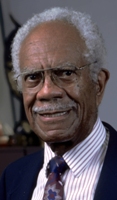
Dr. Charles Whitten, M.D., associate dean emeritus of the Wayne State University School of Medicine, died Aug. 13. He was 86.
"Dr. Whitten was a pioneer in the field of medical education," said Robert Frank, M.D., executive vice dean for the School of Medicine. "He founded the post baccalaureate program at Wayne State University School of Medicine, which was a national model for the inclusion of under-represented minority students in schools of medicine. Dr. Whitten revolutionized the curriculum at our School of Medicine, and was a personal mentor to many of our current medical educators."
The post baccalaureate program led to Wayne State University leading the nation's 125 medical schools (exclusive of Howard and Meharry) in the total number of African-American graduates from 1981 to 1997. One-third of them had entered through his program.
In addition to developing the post baccalaureate program in 1969, Dr. Whitten formed the Sickle Cell Detection and Information Center, the most comprehensive community program in the country, and facilitated the creation of the National Association for Sickle Cell Disease.
As chief of Pediatrics at Detroit Receiving Hospital, he was the first African-American physician to head a department in a Detroit hospital.
Dr. Whitten, who served more than 40 years as a member of the School of Medicine faculty, served 16 years as associate dean for Curriculum before entering semi-retirement in 1993 as professor and dean emeritus.
"Dr. Whitten was best known for his pioneering work in sickle cell anemia screening and development of novel educational tools for teaching children and families with sickle cell anemia," said Yaddanapudi Ravindranath, M.B.B.S., professor of Pediatrics and the Georgie Ginopolis Chair for Pediatric Cancer and Hematology at the School of Medicine, and co-director of the Division of Hematology/Oncology for Children's Hospital of Michigan. "His forceful advocacy paved the way for the routine newborn screening for sickle cell anemia in Michigan and later in the United States."
Dr. Ravindranath said Dr. Whitten's lobbying efforts on behalf of children with sickle cell anemia also helped push the National Heart Lung and Blood Institute to set up the comprehensive sickle cell center program. A pivotal contribution in toxicology was Dr. Whitten's work at Children's Hospital of Michigan on acute iron poisoning and strategies for its treatment, which developed the standard of care to date.
"We are very saddened by his death but take pride in his many legendary contributions in the care of children," Dr. Ravindranath said. "Dr. Whitten represented Children's Hospital of Michigan, Wayne State University School of Medicine and the city of Detroit with great dignity and wisdom. We will miss him."
Dr. Whitten received the School of Medicine's inaugural Pathfinders in Medicine Award in 2000 for his contribution to equality and diversity in the medical community. That same year, Meharry Medical College named him its Alumnus of the Year.
The Black Medical Association has established the Charles F. Whitten Lifetime Achievement Award, which is presented annually. The first award went to Dr. Whitten. The Sickle Cell Disease Association of America presented him with a Legacy Award for his 21 years of service in that organization's leadership. He also was honored with a Special Recognition Award from the Association of American Medical Colleges for his pioneering efforts in medical education and treatment.
Funeral and service information will be provided when it becomes available.